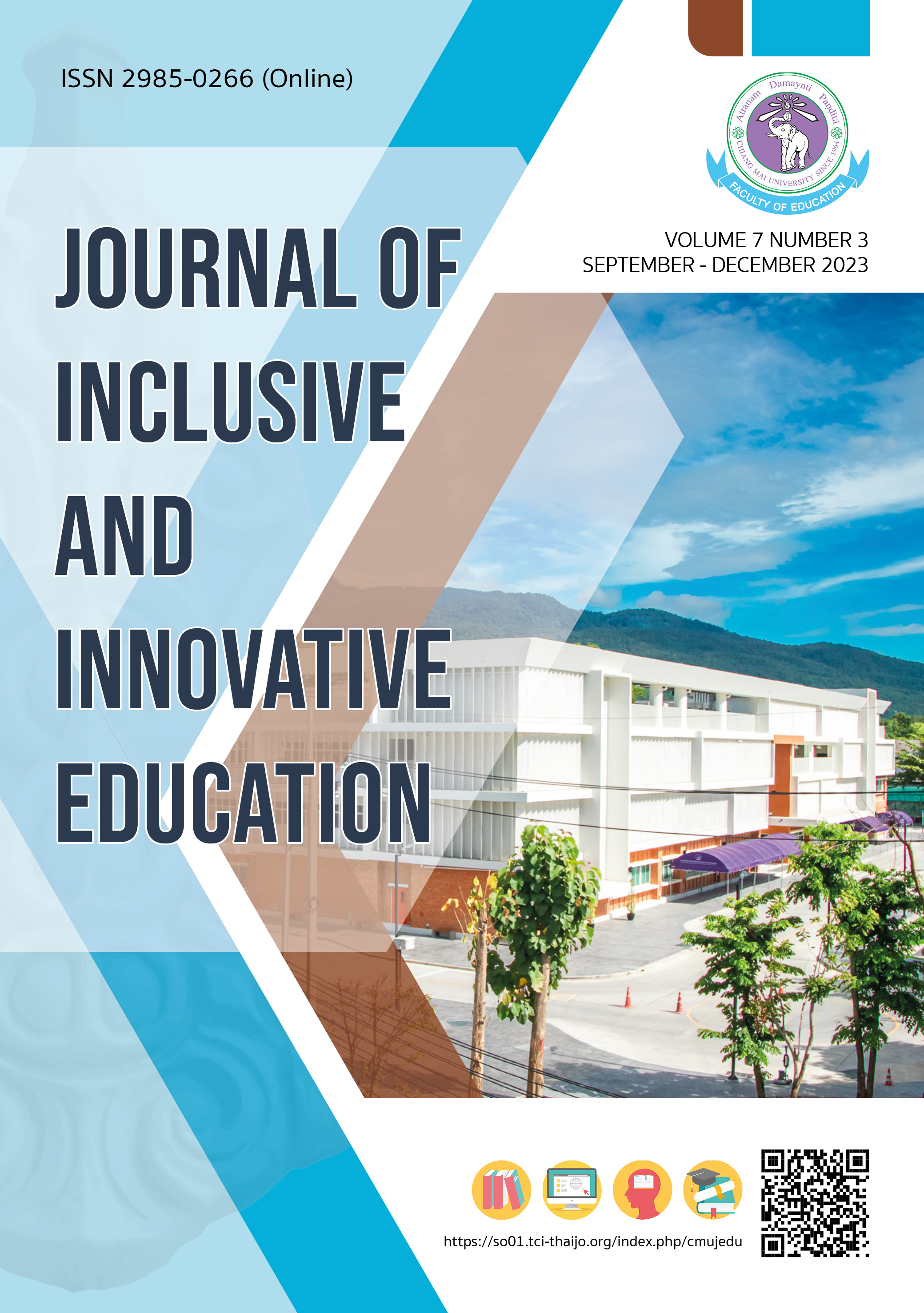การวิเคราะห์ความรู้สึกจากข้อความบนทวิตเตอร์เกี่ยวกับระบบการคัดเลือกกลางบุคคลเข้าศึกษาในสถาบันอุดมศึกษา
Main Article Content
บทคัดย่อ
งานวิจัยนี้มีวัตถุประสงค์เพื่อวิเคราะห์ความรู้สึกจากข้อความบนทวิตเตอร์ของข้อความของผู้ใช้งานทวิตเตอร์ที่เกี่ยวข้องกับระบบการคัดเลือกกลางบุคคลเข้าศึกษาในสถาบันอุดมศึกษา ในช่วง 6 ปีที่ผ่านมา (พ.ศ. 2561-2566) โดยใช้เทคนิคการจำแนกความรู้สึกผ่านการเรียนรู้ของเครื่อง (machine learning) ในกลุ่มของการเรียนรู้แบบมีการชี้แนะ (supervised learning) สำหรับกระบวนการวิจัยประกอบด้วย 4 ขั้นตอนดังนี้ 1) รวบรวมข้อมูลจากทวิตเตอร์ด้วยเทคนิคการดึงข้อมูล (data scraping) ผ่านแพลตฟอร์ม Apify โดยระบุและไม่ระบุแฮชแท็ก # (hashtag) 2) เตรียมข้อมูล โดยใช้กระบวนการตัดคำออกจากข้อความ กรองข้อมูล และการลบคำหยุด เพื่อให้มั่นใจว่าข้อมูลเหมาะสมสำหรับการวิเคราะห์ในขั้นต่อไป 3) สร้างแบบจำลองโดยการสร้างโมเดลการเรียนรู้ของเครื่องโดยใช้เทคนิคการวิเคราะห์ความรู้สึก โดยใช้แนวทางการเรียนรู้แบบมีผู้สอน 4) ประเมินโดยการนำผลการทำนายเข้ากระบวนการประเมินโมเดลเพื่อวัดความแม่นยำ (accuracy) และพิจารณาค่าสัดส่วนระหว่าง ความแม่นยำ และค่าความระลึก (recall) ผลการวิเคราะห์พบว่า โมเดลมีความสามารถในทำนายที่ดี F1 score มีค่าสูง มีค่าอยู่ระหว่าง .60 – .98 ผลการวิเคราะห์ข้อมูลความรู้สึกจากข้อความบนทวิตเตอร์ของนักเรียนเกี่ยวกับระบบการคัดเลือกกลางบุคคลเข้าศึกษาในสถาบันอุดมศึกษา ในช่วง 6 ปีที่ผ่านมา (พ.ศ. 2561-2566) พบว่าข้อความที่วิเคราะห์ทั้งหมด 2,145 ข้อความ แสดงให้เห็นถึงความรู้สึกทางลบ จำนวน 2,098 ข้อความ (ร้อยละ 97.80) ในขณะที่ข้อความที่แสดงถึงความรู้สึกทางบวกมีจำนวน 47 ข้อความ (ร้อยละ 2.20)
Article Details

อนุญาตภายใต้เงื่อนไข Creative Commons Attribution-NonCommercial-NoDerivatives 4.0 International License.
หากผู้เสนอบทความมีความจำเป็นเร่งด่วนในการตีพิมพ์โปรดส่งลงตีพิมพ์ในวารสารฉบับอื่นแทน โดยกองบรรณาธิการจะไม่รับบทความหากผู้เสนอบทความไม่ปฏิบัติตามเงื่อนไขและขั้นตอนที่กำหนดอย่างเคร่งครัด ข้อมูลของเนื้อหาในบทความถือเป็นลิขสิทธิ์ของ Journal of Inclusive and Innovative Education คณะศึกษาศาสตร์ มหาวิทยาลัยเชียงใหม่
เอกสารอ้างอิง
Al-Hail, M., Zguir, M. F., & Koç, M. (2023). University students’ and educators’ perceptions on the use of digital and social media platforms: A sentiment analysis and a multi-country review. Iscience, 26(8), 1-26.
Agarwal, A., Xie, B., Vovsha, I., Rambow, O., & Passonneau, R. J. (2011). Sentiment analysis of twitter data. In Proceedings of the workshop on language in social media (LSM 2011), 30-38.
Baker III, F. W. (2014). Open dialogue: A content analysis of the #openeducation Twitter hashtag. In Proceedings of the Association of Educational Communication Technology Annual Conference, Jacksonville, FL. 20-29.
Bonta, V., Kumaresh, N., & Janardhan, N. (2019). A comprehensive study on lexicon based approaches for sentiment analysis. Asian Journal of Computer Science and Technology, 8(S2), 1-6.
Bunroekand, P. & Sornwaree, N. (2023). Deming Cycleand University Admissions. Journal of Interdisciplinary Research and Educational Innovation, 2(1), 29-38. [in Thai]
Chauhan, G. S., Agrawal, P., & Meena, Y. K. (2019). Aspect-based sentiment analysis of students’ feedback to improve teaching–learning process. In Information and Communication Technology for Intelligent Systems: Proceedings of ICTIS 2018, Volume 2 (pp. 259-266). Springer Singapore.
Chetpayark, K. (2018). How often to change? The THAI admission systems: generation gap between father and son. Retrieved from https://thematter.co/quick-bite/thai-education-system/57485[in Thai]
Contreras, D., Wilkinson, S., Alterman, E., & Hervás, J. (2022). Accuracy of a pre-trained sentiment analysis (SA) classification model on tweets related to emergency response and early recovery assessment: the case of 2019 Albanian earthquake. Natural Hazards, 113(1), 403-421.
Gupta, I., & Joshi, N. (2019). Enhanced twitter sentiment analysis using hybrid approach and by accounting local contextual semantic. Journal of intelligent systems, 29(1), 1611-1625.
Jindal, N., & Liu, B. (2006, August). Identifying comparative sentences in text documents. In Proceedings of the 29th annual international ACM SIGIR conference on Research and development in information retrieval (pp. 244-251).
Liang, B., Su, H., Gui, L., Cambria, E., & Xu, R. (2022). Aspect-based sentiment analysis via affective knowledge enhanced graph convolutional networks. Knowledge-Based Systems, 235, 107643.
Limwattanaphan, N. (2021). TCAS Administrative District, an educational area where everyone sees the problem but can't do anything. Retrieved from https://mappalearning.co/tcas65-special-administrative-region/. [in Thai]
Faugchun, P. (2019). TCAS and the Stable Matching Problem: Theory and Implementation. International Journal of East Asian Studies, 23(1), 116-147. [in Thai]
Giachanou, A., & Crestani, F. (2016). Like it or not: A survey of twitter sentiment analysis methods. ACM Computing Surveys (CSUR), 49(2), 1-41.
Kiniman, K., Sritrakul, P., Jenjit, A., & Teeravanittrakul, S. (2021). FACTORS AFFECTING DECISION MAKING ON PURSUING A BACHELOR’S DEGREE OF FRESHMEN: A CASE STUDY OF A UNIVERSITY IN EASTERN REGION. Journal of Education Burapha University, 32(3), 87 – 102. [in Thai]
Mehta, P., & Pandya, S. (2020). A review on sentiment analysis methodologies, practices and applications. International Journal of Scientific and Technology Research, 9(2), 601-609.
Mercha, E. M., & Benbrahim, H. (2023). Machine learning and deep learning for sentiment analysis across languages: A survey. Neurocomputing, 531, 195-216.
Mitra, A. (2020). Sentiment analysis using machine learning approaches (Lexicon based on movie review dataset). Journal of Ubiquitous Computing and Communication Technologies, 2(03), 145-152.
Ministy of Education. (2017). Announcement of Ministy of Education - Thai University Central Admission: TCAS. Retrieved from https://reg.kmitl.ac.th/TCAS_old/news/files/2562_1_news1_492_2018_10_31-14-27-44_151c2.pdf. [in Thai]
Nandwani, P., & Verma, R. (2021). A review on sentiment analysis and emotion detection from text. Social Network Analysis and Mining, 11(1), 81.
Nawaz, F. A., Riaz, M. M. A., Tsagkaris, C., Faisal, U. H., Klager, E., Kletecka-Pulker, M., ... & Atanasov, A. G. (2023). Impact of# PsychTwitter in promoting global psychiatry: A hashtag analysis study. Frontiers in Public Health, 11, 1065368.
Nazir, F., Ghazanfar, M. A., Maqsood, M., Aadil, F., Rho, S., & Mehmood, I. (2019). Social media signal detection using tweets volume, hashtag, and sentiment analysis. Multimedia Tools and Applications, 78, 3553-3586.
Onyenwe, I., Nwagbo, S., Mbeledogu, N., & Onyedinma, E. (2020). The impact of political party/candidate on the election results from a sentiment analysis perspective using# AnambraDecides2017 tweets. Social Network Analysis and Mining, 10, 1-17.
Pang, B., & Lee, L. (2008). Opinion mining and sentiment analysis. Foundations and Trends® in information retrieval, 2(1–2), 1-135.
Poria, S., Peng, H., Hussain, A., Howard, N., & Cambria, E. (2017). Ensemble application of convolutional neural networks and multiple kernel learning for multimodal sentiment analysis. Neurocomputing, 261, 217-230.
Sudaduong, C. (2022). What are Top Problems Thai Students Face on TCAS admission system. Retrieved from https://thematter.co/quick-bite/tcasproblem/166185. [in Thai]
Suthasinobon, K. (2021). A Study of the Problema Situation, and the Facilitating and Obstacles Factors to Admission Process of Undergraduate Students in Education Program. Journal of Social Science and Buddhistic Anthropology, 6(3), 420-435. [in Thai]
Tanakornnuwat, P. (2022). Stress of Grade 6 Students to Take the University Entrance Exam in 2023 (TCAS 66). Journal of Institute of Trainer Monk Development, 5(4), 52-59. [in Thai]
Valencia, F., Gómez-Espinosa, A., & Valdés-Aguirre, B. (2019). Price movement prediction of cryptocurrencies using sentiment analysis and machine learning. Entropy, 21(6), 589.
Villanueva, L., Prado-Gascó, V., & Montoya-Castilla, I. (2022). Longitudinal analysis of subjective well-being in preadolescents: The role of emotional intelligence, self-esteem and perceived stress. Journal of health psychology, 27(2), 278-291.
Worapitaksanond, T. & Charoenratana, S. (2022). Impact of Inequality on Higher Education Admissions of Thai Students. The Journal of Research and Academics, 5(6), 203-216. [in Thai]
Yue, L., Chen, W., Li, X., Zuo, W., & Yin, M. (2019). A survey of sentiment analysis in social media. Knowledge and Information Systems, 60, 617-663.


